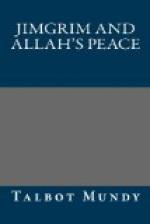Beside the Burj-ez-Zahir is a tunnel, faced by an unquestionable Roman arch. Outside it there were more than a dozen armed men lounging, and a lot of others looked down at us through the ruined loop-holes of the wall above. Their leader challenged our numbers at once, and refused admission. Judging by Anazeh’s magnificently insolent reply it looked at first as if he intended fighting his way in. But that turned out to be only his diplomatic manner—establishing himself, as it were, on an eminence from which he could make concessions without losing dignity.
The arrangement finally agreed to was Anazeh’s suggestion, but showed diplomatic genius on both sides. The old man divided up his party into sets of three, and asserted that every set of three was independent. There were twenty-two of us all told, including Ahmed, but he described Ahmed as a prisoner, and offered to have him shot if that would simplify matters.
There was a great deal of windy discussion about Ahmed’s fate, during which his face grew the color of raw liver and he joined in several times tearfully. Once he was actually seized and half-a-dozen of the castle guards aimed at him; but they compromised finally by letting him go in with hands tied. Nobody really wanted the responsibility of shooting a man who had smuggled stolen cartridges across the Dead Sea, and might do it again if allowed to live.
We rode for eighty or a hundred paces through an echoing tunnel into a city of shacks and ruined houses that swarmed with armed men, and it was evident that we were not the only ones who had ignored the rule about numbers. Anazeh explained in an aside to me that only those would obey that rule who did not dare break it.
“Whoever makes laws should be strong enough to enforce them,” he said sagely. “And whoever obeys such a law is at the mercy of those who break it,” he added presently, by way of afterthought. To make sure that I understood him he repeated that remark three times.
Every house had its quota of visitors, who lounged in the doorways and eyed us with mixed insolence and curiosity. There were coffee-booths all over the place that seemed to have been erected for the occasion, where, under awnings made of stick and straw, men sat with rifles on their knees. Those who had provender to sell for horses were doing a roaring trade—short measure and high price; and the noise of grinding was incessant. The women in the back streets were toiling to produce enough to eat for all that host of notables.
To have had to hunt for quarters in that town just then would have been no joke. There was the mosque, of course, where any Moslem who finds himself stranded may theoretically go and sleep on a mat on the floor. But we rode past the mosque. It was full. I would not have liked a contract to crowd one more in there. Perhaps a New York Subway guard could have managed it. The babel coming through the open door was like the buzzing of flies on a garbage heap.




